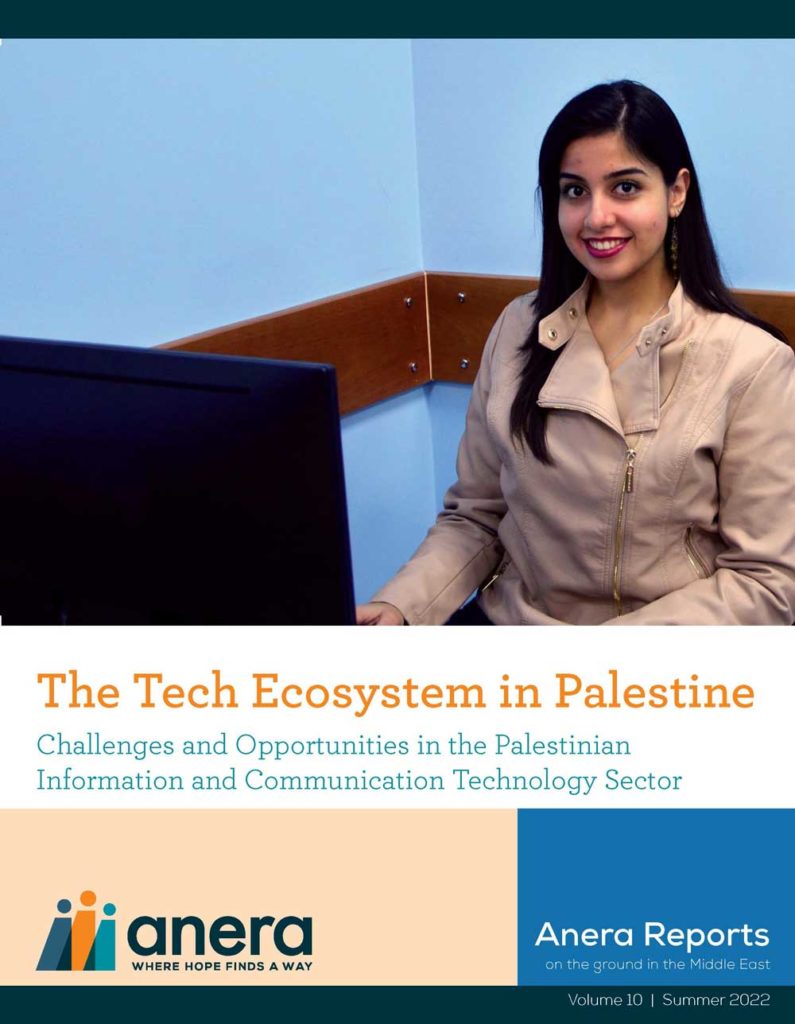Anera on the Ground: The Tech Ecosystem in Palestine
Posted in: Report, Society & culture, Voices from the field
Professionals in the field of information and communications technology (ICT) are and will continue to be among the most prized and sought after in the global job market. Each year, more work moves into the digital space – now accelerated by the changes COVID-19 has brought to the work world. And digital skills are increasingly critical for all professionals, even those not specialized in ICT jobs.
There is a great source of talent – and a good value proposition – to be tapped in Palestine. Palestine is in a time zone that is close to Europe and the Arab Gulf countries – large, wealthy markets in desperate need of more ICT talent. Palestinians are highly literate, well-educated, and many speak English well.
The Palestinian tech ecosystem is still small, but it has been growing in the past 15 years. The majority of the existing tech businesses provide outsourcing services, mostly to local companies, while some also outsource to regional and international businesses and organizations. Outsourcing accounts for more than 80% of the Palestinian tech ecosystem. Palestinian startups and other local tech companies account for the rest. There are many initiatives, accelerators and incubators in Palestine working to help young entrepreneurs actualize their ideas and bring them to market as well as to upskill tech graduates and other aspiring tech career candidates. Digital businesses are playing an increasingly important role in the Palestinian economy. There were 677 ICT firms in 2018 – 34% more than in 2008. Employment in the information and communications technology industry almost doubled over the same time frame. About half of these firms are in the telecommunications industry, and 144 are in computer programming and consultancy-related activities. The Palestinian ICT sector contributes about $493 million to the economy, accounting for approximately 3% of gross domestic product.
ICT service exports comprised 15% of all service exports in 2017, up from 0.6% in 2000. And the value of these service exports increased significantly, from less than $2 million in 2000 to more than $85 million in 2017.
Palestinian universities in the West Bank, Gaza and Arab East Jerusalem graduate approximately 2,500 Palestinian tech graduates each year. Of these graduates just 10% get hired by top companies right after graduation. Many of the remainder end up looking for jobs in other fields, because they lack the technical and/or other durable job skills that would make them competitive in the IT world. Others find that they do not know how to market themselves for job openings.
Those tech graduates who do get hired in ICT fields start at wages that are competitive against other industries. Fresh graduates joining Palestinian tech companies might expect to make about $1,200/month in the West Bank and around $800/month in Gaza. However, with more and more demand for new talent, Palestinian tech companies are forced to stretch their salary scales in order to compete with international and Israeli companies, which tend to attract top-performing graduates as well as experienced professionals. Those who do manage to get hired by international companies often end up leaving Palestine, thus contributing to brain drain.
In the past decade, significant international funding has come into Palestine to support the ICT sector. Initially the funding went largely to supporting startups and entrepreneurs. In the past two years, though, the focus has moved more to upskilling training programs. These programs’ performance indicators generally have measured the number of people or startups reached and supported, rather than the impact of the support they provided to students in the mid-term and long-term. As a result, the quality of the programs suffers and some youth have grown skeptical about what they can gain from enrolling.
Though the challenges in the Palestinian tech ecosystem are great, the opportunities for improvement and growth are exciting and within reach over the near future. Palestine has educational infrastructure and systems in place; a large pool of talented, smart people with energy and initiative; and supporters the world over ready to transform potential into reality.
Read the report >>
Print the report >>
OUR BLOG
Related
Part of a series on the impact of the war on all sectors of economic life within Gaza, Anera’s immediate response and plans for the future. Other posts cover housing, education, WASH, health and food production systems. Livelihood Recovery In Gaza, 57 years of occupation and…
InterAction and 50 Member CEOs, some of whom have organizations that work in Gaza, urge President Biden to take decisive and actionable steps to alleviate the humanitarian crisis in Gaza. Detailed within this letter are specific steps and commitments that…


